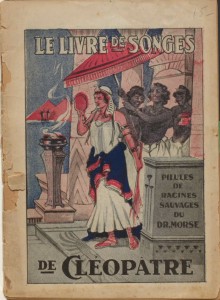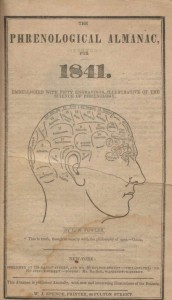This is part of a series of posts designed to expose readers to the range of materials we have here at the Osler Library and provide tips on how to find and use specific resources. These various installments will form the basis of a comprehensive Osler Library user guide. Your questions and feedback are welcome!
About
The Osler Library has a large collection of medical almanacs, for which we are still actively acquiring. The almanacs date from 1840 to 1977, with the largest number of holdings falling between 1900 and 1925. The almanac is an old genre of ephemeral—temporary or non-durable publications—that traces its history to the medieval period. These popular  items originally consisted of calendars with events, religious holidays, moon phases, and astronomical tables that provided an outlook on the upcoming year. Medical almanacs in particular were an important facet of premodern medicine as doctors took astrological information into consideration in the diagnosis and treatment of their patients. By the mid-18th century in the US and towards the end of the 18th century in Canada, almanacs were popular household books that provided health and home tips along with calendrical features. As such, they are an important source of information on lay medical culture.
items originally consisted of calendars with events, religious holidays, moon phases, and astronomical tables that provided an outlook on the upcoming year. Medical almanacs in particular were an important facet of premodern medicine as doctors took astrological information into consideration in the diagnosis and treatment of their patients. By the mid-18th century in the US and towards the end of the 18th century in Canada, almanacs were popular household books that provided health and home tips along with calendrical features. As such, they are an important source of information on lay medical culture.
The majority of our almanacs are published in Canada, the oldest of which is Le livre de songes de Cléopâtre (Cleopatra’s book of dreams), published in French in Brocktown, Ontario, and Morristown, New York, sometime between the years 1857 and 1881. The oldest almanacs are American, such as The phrenological almanac for 1841, published in 1840. British almanacs make up a much smaller subset, with a few almanacs published
simultaneously in Canada and the U.K. and a couple homeopathic tractates from the 1970s. The majority of the almanacs in the collection are what is known as patent medicine almanacs, used by drug manufacturers as an advertising medium. Nearly 200 of the almanacs were originally purchased from a Montreal collector and acquisitions are ongoing.
Finding information
Our medical almanacs can be located through the McGill online library catalogue. The almanacs have historically been kept in a separate database, accessible through this website. The database is now no longer updated and new accruals are being catalogued in the McGill Library catalogue. Most of the almanacs that were previously only findable through the Almanacs database have now been added to the McGill catalogue as well.
An easy way to find almanacs in the library catalogue is by using the Classic Catalogue (also linked to on the library homepage) and the name of Almanac Collection, Osler Library. Once in the Classic Catalogue, you can select an Advanced Search, which will give you the option of selecting either “Advanced,” “Expert,” or “Browse.” Select the “Browse” tab and enter in the name of the collection (inside quotation marks to indicate it is a phrase): “Almanac collection, Osler Library.” Click on the link to the collection that should appear on the top of the list. Once you are inside this list of almanacs, it is possible to modify your search by using the “Limit Results” function (accessed through the pink button above the results listing). From here, you can pare down the list of almanacs by entering a keyword, date range, year of publication, or language.
General information
The almanacs may be used by in-house visitors only. Researchers are welcome during our opening hours. It’s recommended to make an appointment, but not necessary. You will be asked to leave coats and bags in our coatroom, fill out a form with your information, and leave a student card or other piece of identity with us during the time that you’re consulting materials. Only pencils can be taken into our reading rooms and staff will instruct you on proper handling of fragile materials.
Happy researching!
Further reading
Thomas A. Horrocks, Popular print and popular medicine: almanacs and health advice in early America. Amherst, MA: Univ. of Massachusetts Press, 2008.
Time, tide, and tonics: the patent medicine almanac in America. National Library of Medicine online exhibition.
John B. Blake, “From Buchan to Fishbein: the literature of domestic medicine.” In Guenter B. Risse, Ronald L. Numbers, and Judith Walzer Leavitt, eds., Medicine without doctors: home health care in American history, 11-30. New York: Science History Publications, 1977.
Elizabeth Hulse, “Almanacs.” The Canadian Encyclopedia


